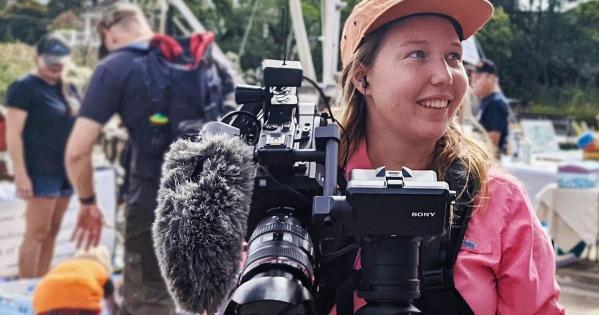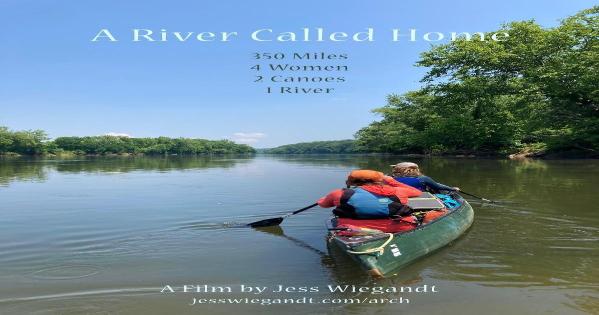Four Women + 350 Miles of River = Great Documentary

Jess Wiegandt (SOC/MFA ‘23) has traveled the world and explored many of its waterways as a kayak instructor and competitive kayaker. But she has always had a special tie to the James River, where she was raised. Since the age of six she has had her own kayak and was out on the water regularly with her parents, who are both teachers and paddlesport instructors. A River Called Home is an homage to the James, a call to action to those who care about our waterways and the wildlife who live there, and a celebration of teamwork and friendship. It has screened at the River Run Festival at the Kennedy Center, the Annapolis Film Festival, and the National Paddling film festival, to name a few.
Wiegandt studied experiential learning and journalism as an undergraduate and became interested in filmmaking her senior year when working on an investigative video journalism project. She came to AU to pursue her MA in film and media production but decided to stay on to earn an MFA in environmental and social impact filmmaking, working with SOC’s Center for Environmental Filmmaking (CEF).
When the COVID pandemic canceled her plans to shoot her capstone documentary about jaguars in Panama, she looked around and realized she had the makings of a great story right in her own backyard. Her idea? To paddle the 350-mile length of the James River, from its headwaters to the Chesapeake Bay, with a small team and collect water samples for testing and meet with others concerned about the health of the river along the way. For Wiegandt, it’s more than just a capstone. “[The James] has really shaped who I am today, it raised me,” she says in the opening of the film.
She called on two SOC MFA students from an earlier cohort, Grace Eggleston and Beth Ebisch, to be part of the project as director of photography and second camera. Although they hadn’t all collaborated before, they were all involved with CEF and had shared expertise in nature documentary. What Eggleston and Ebisch didn’t have experience in, though, was a multi-day canoe trip. Or any canoe trips, really. And they received no training or practice runs before setting off on the 21-day journey. “I just taught them on the fly,” said Wiegandt.
The final member of the team was Sejal Kinker, an American Canoe Association instructor and Wiegandt’s paddling mentor, who had taken her on some of the biggest whitewater in the world. Her knowledge of paddling and the James was invaluable, and her laughter was infectious. One thing that really comes through in the film is what a great time the women are having as they immerse themselves in nature, test their paddling and outdoor cooking skills, and even when they flip over in the canoe (only once!).
 The film does have a serious side, too. Agricultural and industrial runoff and sewage overflows have been impacting the water quality in the James for years, and Wiegandt was able to partner with a biology teacher who assigned her students to do the water analysis both for the scientific challenge but also as a way to help them connect to the river. The students are able to meet up with the crew and learn how they collect the samples. Although the students have grown up beside it, they had never really considered what might be in it. “I was honestly surprised to see just how contaminated some of this water was,” said one student.
The film does have a serious side, too. Agricultural and industrial runoff and sewage overflows have been impacting the water quality in the James for years, and Wiegandt was able to partner with a biology teacher who assigned her students to do the water analysis both for the scientific challenge but also as a way to help them connect to the river. The students are able to meet up with the crew and learn how they collect the samples. Although the students have grown up beside it, they had never really considered what might be in it. “I was honestly surprised to see just how contaminated some of this water was,” said one student.
The team also interviews a policy analyst for the James River Association, who explains how badly the river was polluted 50 years ago, when the Clean Water Act was created, and why it’s crucial to the people and wildlife that live in and around the river not to let that happen again. And they visit a wastewater treatment plant, where they learn more about the challenges faced by the facility when there are big storms. Shortly before filming, VA put a new law in place to improve the efficacy of the plant in the coming years to ensure that no raw sewage reaches the river, period. The film’s website includes links to resources for those who want to learn more about protecting the river and our waterways in general.
When she isn’t attending screenings of A River Called Home, Wiegandt is working with a different team on a new project focusing on the lower Snake River dams that calls for expertise in both kayaking and filmmaking – in other words, it’s a perfect fit.
